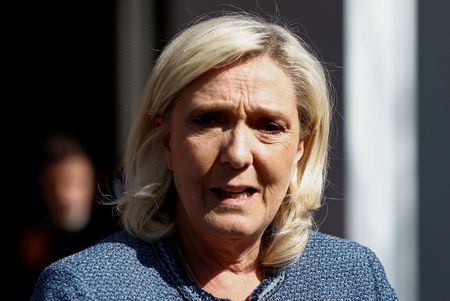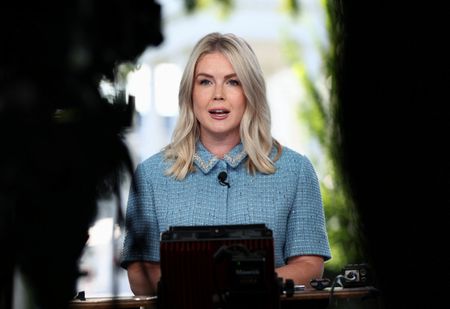By Gabriel Stargardter
PARIS (Reuters) – Far-right leader Marine Le Pen believed respect for France’s cherished institutions would open her path to the presidency, betting it would endear her once-fringe party to mainstream French voters.
She launched the tactic after a resounding 2017 election loss to President Emmanuel Macron and it was working well until it unravelled on Monday, when a Paris court convicted her of embezzlement and barred her from running in the 2027 presidential vote that many believed she could win.
Le Pen, 56, was convicted of misappropriating European Union funds and given an immediate five-year ban from running for public office that will stand even pending appeals.
Unless she can get her sentence overturned before the 2027 election, her National Rally (RN) party will have to find a new candidate for the next election, most likely 29-year-old party President Jordan Bardella.
“Today, it is not only Marine Le Pen who is being unjustly convicted,” Bardella wrote on X. “It is French democracy that is being executed,” he added, in criticism echoed by political supporters at home and abroad.
Le Pen’s ouster from the 2027 presidential race is likely to fuel a growing global debate over how unelected judges police politicians, and particularly those on the far right.
The presiding judge who handed down Le Pen’s ban said no politician was above the law, while prosecutors who had sought the measure said they were simply availing themselves of toughened anti-corruption laws approved by lawmakers in 2016. Those laws have led to immediate political bans such as that faced by Le Pen becoming more common in France.
“At what point do we think that a judge will not apply the law?” centrist lawmaker Sacha Houlié wrote on X. “Is society so sick that it is offended by what is nothing more and nothing less than the rule of law?”
Le Pen and her allies alleged a witch-hunt to keep her and the RN from power, echoing claims made by Donald Trump over his legal woes as he campaigned last year to return to the White House.
Yet her pursuit of power has been far less anti-institutional than that of President Trump, who since returning to office two months ago has sought to make good on election promises to thoroughly upend domestic and foreign policy.
In contrast, Le Pen has worked hard to “professionalize” the RN, a party once known exclusively for racism and antisemitism. After her 2017 election loss, she made her lawmakers wear suits and ties as they professed their “French first” messaging on TV appearances.
She reined in some of the party’s more radical anti-immigrant messaging, and later focused on pocketbook issues such as cost of living, pledging to play by the rules of France’s Fifth Republic.
The effort appeared to pay off. Le Pen came to be seen as a president-in-waiting by a growing number of voters – with opinion polls making her the front-runner for 2027 – while the RN became France’s largest single parliamentary party.
But the RN’s future may now lie without her, as she faces an uphill battle to make a fourth tilt at the presidency.
Brigitte Bareges, a right-wing former mayor who, like Le Pen, received an immediate five-year political ban following a conviction for graft in 2021, said that despite Le Pen’s conviction, she had been right to bet on a pro-institutional line.
“Unfortunately, there are too many judges who play politics. And that’s a real issue, but it must be reversed with republican means, by elections, through changes in the law,” she said. “We’re not going to stage a coup. We’re not despots.”
BARDELLA RISES?
Arnaud Benedetti, a political analyst who has written a book on the RN’s rise, said Le Pen’s sentence would likely deepen growing distrust of the judiciary in France.
“This is an event which, on the political, institutional, and democratic level, has an obvious impact,” he said. “If there is a certain distrust of politicians in France, there is a very great distrust of the justice system in France.”
The loss of Le Pen poses “a big, big, big problem” for the RN, he added, as he doubted Bardella was experienced enough to hold his own in the 2027 election. Macron is barred from seeking a third term. Benedetti said voters may prefer “a more experienced profile” like Interior Minister Bruno Retailleau.
An Odoxa-Mascaret poll, published by Public Senat on Monday, suggested Bardella’s ascent may actually be good for the RN.
The poll, taken before Monday’s ruling, showed 66% of French people – and 69% of RN voters – believed Le Pen’s barring would not hurt the RN, while around a quarter believed it would be beneficial, allowing Bardella to take the helm.
(Reporting by Gabriel Stargardter; Editing by Richard Lough and Frances Kerry)











